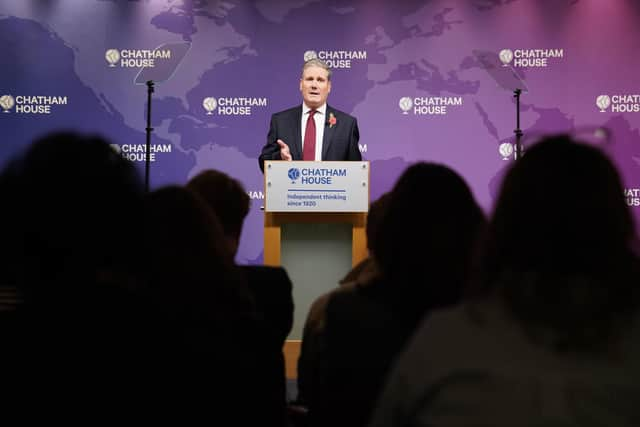Sir Keir Starmer has been Prime Ministerial in his handling of the Israel-Gaza conflict - Bill Carmichael
With Labour streets ahead in the opinion polls, and a general election not much more than a year away, we have to start seeing Sir Keir as a potential Prime Minister, and this latest crisis is a test of whether he is worthy of that label.
In many ways he is an impressive character, rising from a fairly ordinary background in Surrey - the son of a nurse and a toolmaker - to become a successful lawyer and the Director of Public Prosecutions.
Advertisement
Hide AdAdvertisement
Hide AdHe still has that slightly dull, lawyerly attitude, with a stiff posture and a monotonous voice. Some commentators have likened him to the computer generated TV presenter Max Headroom.


I am told by someone who knew him as a teenager that he was a left-wing firebrand in his youth, but today he presents a stolidly centrist, even Blairite, demeanour.
He has some black marks against his record. For example, he not only campaigned to put Jeremy Corbyn into Number Ten, he was also the architect of Labour’s second referendum on Brexit policy that, at least partly, led to the party’s disastrous defeat in the 2019 General Election.
In the following leadership battle he wooed the left of the party by offering ten Corbyn-style pledges, such as abolition of tuition fees and the nationalisation of the utilities and rail, and then showed his ruthless streak by rapidly abandoning the promises once he had won.
Advertisement
Hide AdAdvertisement
Hide AdBut on the plus side under his stewardship he has taken Labour from its worst election defeat since 1935 four years ago, to a position where it is 20-odd points ahead in the polls and hot favourites to form the next government.
And let us not forget the terrible stain of antisemitism that marked Labour during the Corbyn years, with the Equalities and Human Rights Commission ruling the party had “unlawfully harassed” Jewish people.
Sir Keir pledged to root out antisemitism and had the courage to suspend Corbyn from the party when he quibbled with the EHRC’s damning verdict.
But although the influence of the old Israel-hating extreme left has been diminished in Labour, they haven’t gone away entirely - and that explains Sir Keir’s current difficulties, and why he needed to make the speech this week to shore up his position.
Advertisement
Hide AdAdvertisement
Hide AdThe terrible events in Israel and Gaza have re-opened old wounds in the party. More than 60 Labour MPs, and 250 councillors, have called for a ceasefire in defiance of the leadership, and about 30 councillors have resigned.
The revolt is not confined to the grassroots with Labour mayors Sadiq Khan and Andy Burnham, Scottish leader Anas Sarwar, and a number of Sir Keir’s frontbench team rebelling against the official party line.
During his speech Sir Keir said he understood calls for a ceasefire, but argued it was not the right thing to do because it would leave Hamas’s infrastructure intact allowing them to carry out terror attacks.
He said: “Hamas would be emboldened and start preparing for future violence immediately.”
Advertisement
Hide AdAdvertisement
Hide AdInstead he called for a humanitarian pause in the conflict to allow aid to enter Gaza.
I thought it was an impressive performance - serious and calm, and even handed in compassion for Israeli victims of terror and Palestinian civilians caught in the crossfire, while maintaining that Israel has the right to defend itself. You could almost say it was a little bit “Prime Ministerial”.
But there was weakness too. The convention is that frontbenchers publicly follow the agreed party line, or are sacked or required to resign. Yet around 14 shadow ministers have defied Sir Keir without any consequences.
Instead, he acted very conciliatory, saying he would “engage sensitively” with his colleagues' concerns and making no mention of disciplinary action. That may be just about enough to maintain a truce now, but as the casualty figures mount in Gaza the anger will increase, the left will be emboldened, and there is a real chance the party could descend into outright civil war.
The reaction to Sir Keir’s speech, and how he handles the growing fury among many party members to his ‘no ceasefire’ stance will be a real test of his character.